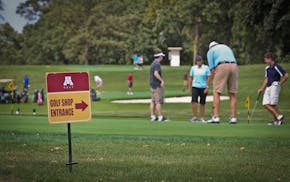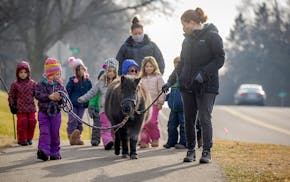Anyone who has visited Rondo Community Library or the George Latimer Central Library in St. Paul in the past few months has already met Robert Edwards III.
He's made sure of it.
Edwards, one of the St. Paul Public Library's new "safety specialists," sees it as a key part of his job to say hello to everyone who visits. It's step 1 to building the relationships key to the library's new safety strategy.
"I get a chance to greet literally every single person who comes through the door," Edwards said. "I set the tone, and provide good energy."
The safety specialist job is part of St. Paul's $1.5 million plan to help everyone feel comfortable in libraries, even as they continue to serve as refuges for people experiencing homelessness, addiction and mental illness.
The money came from the federal government, part of the American Rescue Act, the 2021 COVID recovery bill that sent funding to local governments, businesses and individuals.
Breaking point
Rebecca Ryan, the library's deputy director for public services, said the pandemic made everyone see how libraries have come to serve as a safe place for people with few options.
Librarians were burning out, Ryan said, in part because they weren't always equipped when people in crisis walked through the doors. Old methods of keeping libraries quiet, like contract security guards and lifetime bans for troublemakers, didn't seem to match the library's goal of welcoming all. Something had to change.
So the library's leaders started working out a new way of doing things.
Some of the changes are simple. St. Paul library staff started wearing ID badges on bright blue lanyards, so visitors can tell who works at the library and who they can ask for help.
Other changes are bigger and costlier, funded initially by the one-time federal dollars. The library system hired a safety manager and drew up incident-response plans, and staff have been getting training in behavior management.
New faces on the floor
At the start of this year, Edwards and two other library safety specialists started work at the George Latimer Central Library downtown, the Rondo Community Library and the Rice Street Library in the city's North End.
Ryan said the specialists are eyes and ears on the library floor, engaging with patrons and watching out for people who might be having a hard time.
For Edwards, making people feel safe in the libraries starts with a friendly welcome, and he works to build real relationships with regulars. Most days, his work consists of greeting patrons and walking around the library floors. He sometimes takes a few minutes to read a book to children, or checks in to see how someone's day is going.
He loves hearing about wins library regulars eke out in sometimes-tumultuous lives — like a man who was excited to tell Edwards about meeting a new friend, or another who is on the road to stable housing.
Edwards sees the work as giving back to his hometown.
"Growing up in St. Paul, spending time in the libraries and rec centers and having mentors who inspired me to be the young man I am today," Edwards said.
Sometimes he has to try to get a visitor to change their behavior, or tell someone they need to take a break from the library for a little while.
There's still zero tolerance for lashing out at staff and for selling drugs in the library. But instead of instituting a lifetime ban or calling police, the safety specialists are given leeway to decide that a guest might be banned from the library for just a week or a month, or work out other resolutions to problems.
Most situations can be resolved with a conversation, Edwards said, and he lays the groundwork for those talks in his everyday rounds.
"I'm just going around, building relationships with people," he said. "It's a blessing to be able to do."
Supreme Court allows DOGE team to access Social Security systems with data on millions of Americans

Thompson found guilty of murder in car crash that killed 5 young women

University of Minnesota is putting its golf course up for sale
Feeding Our Future probe: Apple Valley woman charged with defrauding food program of $1.4 million

